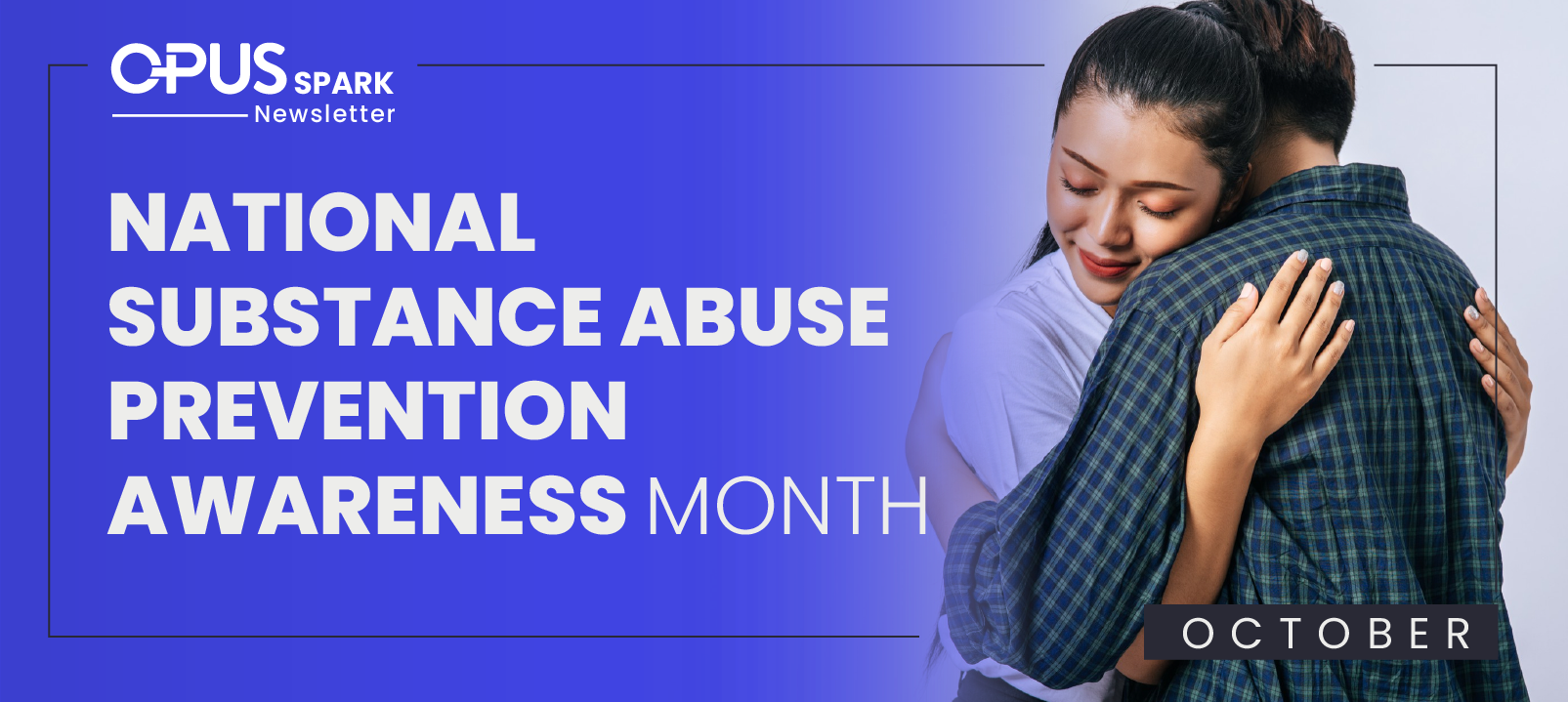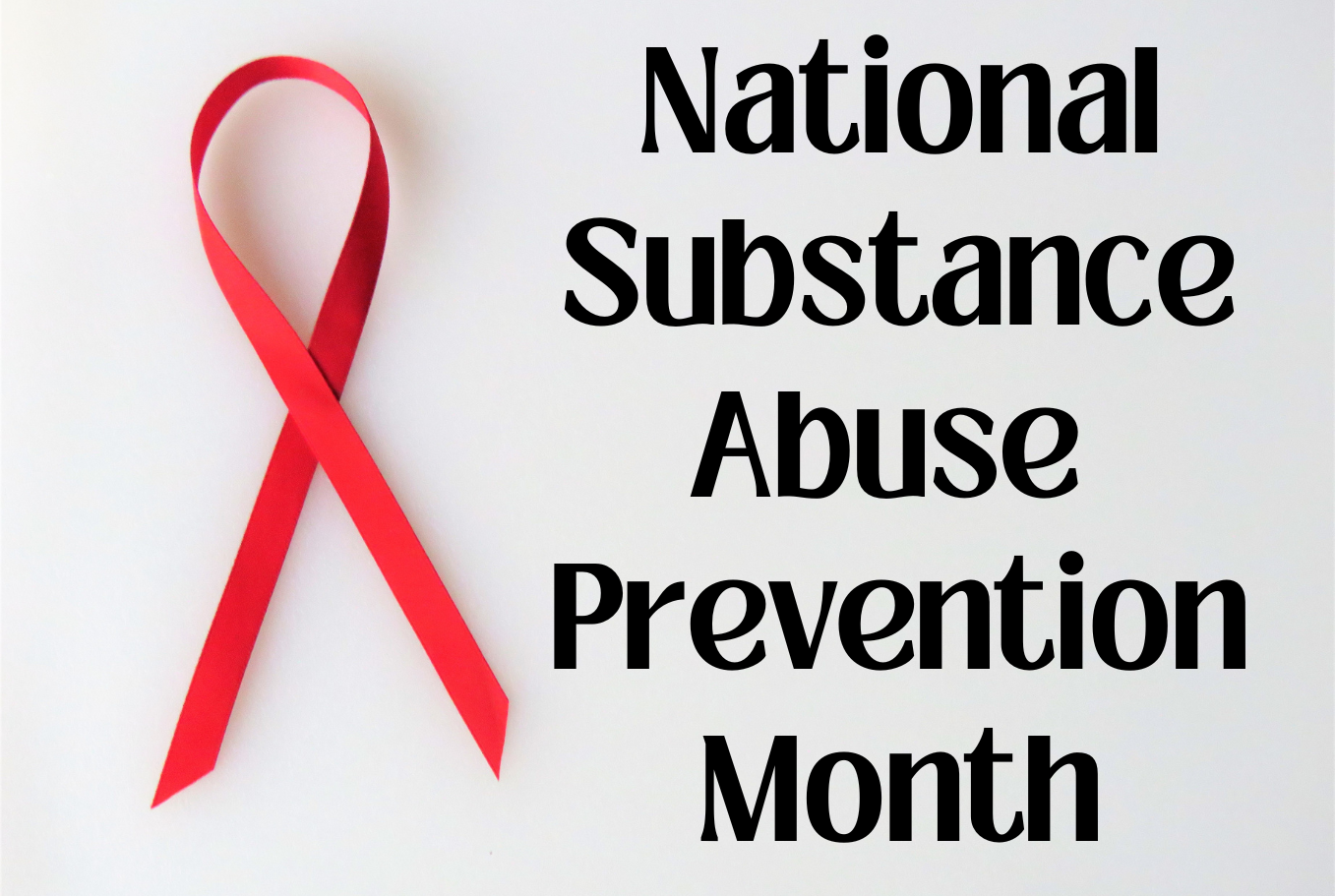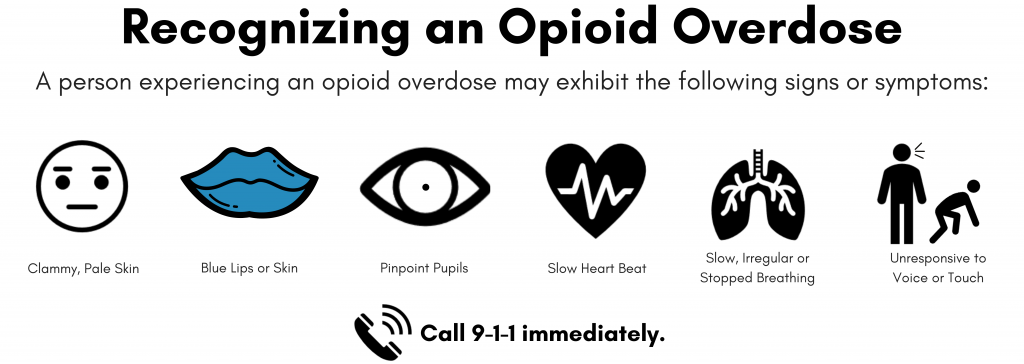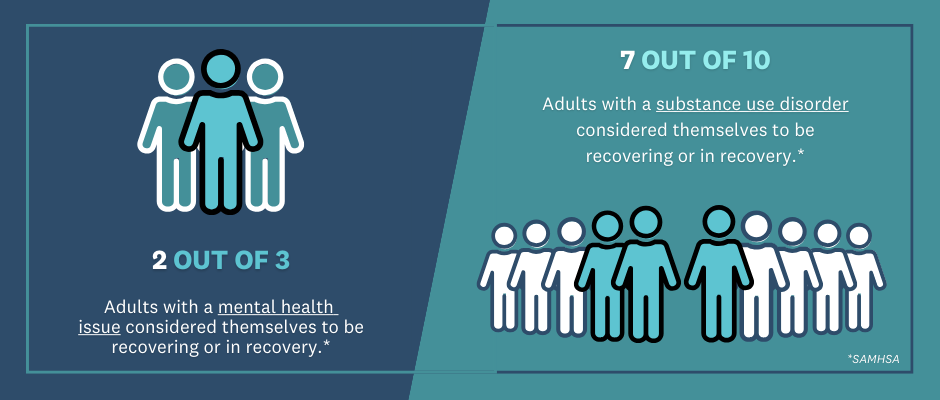
National Substance Abuse Prevention Month
As we enter the brisk and vibrant days of October, I warmly welcome a month of profound importance within the Opus EHR family. It is a time when we unite to shed light on a critical matter - National Substance Abuse Prevention Month.
I want to begin by expressing my heartfelt gratitude to all the clinicians and providers who tirelessly labor in the realm of substance abuse prevention and treatment. Your unwavering dedication, boundless compassion, and resolute commitment to enhancing the lives of individuals and communities grappling with substance abuse are truly remarkable. You are the bedrock of this vital mission, and we stand alongside you, offering unwavering support with all the tools and features you need to support your growing operations.
At Opus EHR, we intimately comprehend the daily challenges that you confront. We acknowledge the pivotal role you play in offering hope and healing to those on the path to recovery. Our mandate is clear - to simplify your operations, streamline administrative burdens, and optimize workflows so that you can concentrate on what genuinely matters - the well-being of your patients.
National Substance Abuse Prevention Month serves as a reminder of the significance of early intervention, preventative strategies, and the profound impact of community support. Together, we are poised to dismantle the barriers of substance abuse treatment, diminish its adverse effects, and forge a pathway toward recovery.
Opus EHR stands steadfast as your partner in success. Our commitment is unwavering in furnishing you with the tools, resources, and robust features to optimize your operations through our innovative systems. We empathize with the unique challenges you encounter and are steadfast in our dedication to assisting you in any conceivable manner.
Our software solutions are artfully crafted to conserve your time, diminish expenditure, and elevate the caliber of care you provide. With Opus EHR, you can rationalize workflows, derive invaluable insights, and concentrate more intently on what genuinely matters most - your patients and clients.
I extend my deepest appreciation for the incredible work that you consistently undertake, day in and day out. The ripple effect of your contributions is immeasurable, and it is our honor to traverse this path with you.
I wish each of you a month teeming with reflection, celebration, and rekindled determination as you persist in leaving an indelible mark on the lives of those you serve. Your steadfast dedication to your clients and patients, and the remarkable work you execute daily merits our heartfelt admiration.
Thank you for your unwavering devotion to this momentous cause. The difference you make in the space we support continually inspires us daily.

Celebrating National Substance Abuse Prevention Month
Since its declaration in 2011, National Substance Abuse Prevention Month has been dedicated to highlighting the critical role of substance abuse prevention in individual and community health, while also remembering those who have faced the challenging journey of substance abuse.
The Power of Prevention: A Lifesaver
Studies have shown that the earlier an individual starts using addictive substances like nicotine, alcohol, or drugs, the greater the risk of developing addiction. This is why prevention is not just a choice but a lifeline for many. National Substance Abuse Prevention Month serves as a reminder that prevention can change lives, support recovery, and ultimately save lives.
Join the Conversation: Youth Substance Use Prevention Month
In the spirit of prevention, October is also recognized as Youth Substance Use Prevention Month. It's an opportunity to engage our youth, parents, educators, and communities in conversations about substance use risks and prevention benefits. Let's empower the next generation with the knowledge and skills to make healthy choices.
Celebrating Milestones
We are gearing up to celebrate SAMHSA's 20th Prevention Day coming up on Monday, January 29, 2024. This event will feature talks by prevention and behavioral health leaders, renowned experts, special guests, training, workshops, and more. Save the date, and let's explore the future of prevention together!
Prevention Resources: Knowledge Is Power
Prevention is science, experience, and research combined. We encourage you to explore the resources available to strengthen protective factors and reduce risk factors in your community:
- Communities That Care (CTC) Curriculum
- Equipping communities with information to create a public health prevention approach.
- CTC Curriculum
- National Registry of Effective Programs and Practices
- A searchable registry of interventions supporting substance abuse prevention and mental health promotion.
- Registry
- National Survey on Drug Use and Health (NSDUH)
- Primary information source on substance use's prevalence, patterns, and consequences.
- NSDUH
- Binge Drinking and Youth: What Everyone Needs to Know
- A webcast addressing binge drinking among youth.
- Webcast
- National Strategy for Suicide Prevention
- Goals and objectives for action in suicide prevention.
- Suicide Prevention Strategy
- Behavioral Health Among College Students: An Information and Resource Kit
- A resource for college and university prevention practitioners.
- Resource Kit
- Too Smart to Start
- Dedicated to preventing underage alcohol use.
- Too Smart to Start
- Stop Underage Drinking
- Federal resources to combat underage drinking.
- Stop Underage Drinking
- Tips for Teens
- Brochures dispelling myths about substance use.
- Tips for Teens
- Top Health Issues for LGBTQ+ Populations Kit
- Information on health issues, including substance abuse, among the LGBTQ+ community.
- LGBTQ+ Health Kit
- Keeping Youth Drug-Free
- A booklet for parents on preventing youth drug use.
- Drug-Free Guide
- National Strategy for Suicide Prevention: How You Can Play a Role in Preventing Suicide
- A fact sheet on individual roles in suicide prevention.
- Suicide Prevention Fact Sheet
These resources cover a wide range of topics related to substance abuse prevention, mental health promotion, and supporting youth and communities in making informed choices.
Prevention Begins with Us
Prevention is a shared responsibility that spans individuals, families, schools, communities, and society as a whole. Together, we can make a difference in the lives of young people, helping them lead healthier lives, make informed choices, and ultimately thrive.
Thank you for being a part of this essential journey. Your dedication to prevention is a beacon of hope for those seeking a brighter, substance-free future.
.png)
Celebrating Excellence: Meet Kira Denney, Clinician of the Month
We are delighted to introduce Kira Denney, the Co-Founder and Co-Owner of Pearl Wellness Practice, as Opus Spark's Clinician of the Month. Kira has earned this recognition for her exceptional leadership, unwavering commitment to making a difference in the Behavioral Health field, and impressive community contributions.
Kira is a licensed clinical supervisor and therapist, extending her services to individuals dealing with disordered eating, eating disorders, and body image concerns across Washington, D.C., Maryland, and Florida. Her journey in Behavioral Health is marked by dedication and a passion for transforming lives.
In her role as the chair-elect for the Washington D.C. International Association for Eating Disorder Professionals, Kira exhibits her dedication to the field's growth and improvement. She also offers invaluable guidance through individual and group supervision, consulting for fellow mental health professionals and practices, and leading psycho-education groups. Kira's expertise in eating disorders, leadership, and management transcends her practice and finds a platform in blogs and podcasts.
Kira's therapeutic approach is grounded in person-centered and cognitive-behavioral (CBT) methods. Through these, she empowers individuals to delve into their core beliefs and behaviors, enabling them to cultivate skills and techniques tailored to their unique lifestyles, needs, and aspirations for personal growth.
When Kira isn't working diligently in her practice and within her professional community, you can find her giving back as the philanthropy chair for her alumni, providing mentorship to psychology students, indulging in sports, or cherishing quality time with family.
What sets Kira apart and earned her the title of Clinician of the Month is her thoughtfulness, inclusiveness, and compassion. She consistently goes the extra mile, whether it's in her leadership, clinical work, or communication, ensuring that every individual she encounters is genuinely seen and heard.
Kira's passion for investing in the growth of others is evident in her roles as a mentor and supervisor. Through these efforts, she aims to enhance the work and lives of emerging clinicians, fostering a brighter future for the field.
With seven years of experience in the mental health arena, Kira Denney is undoubtedly a specialist in eating disorders, body image, and disordered eating. Her journey, marked by resilience and dedication, has positioned her as an esteemed figure in the Behavioral Health landscape.
Kira recognizes the potential of Opus EHR for her practice. Among her priorities when selecting software, she considers factors such as credit card processing fees, client-user friendliness, and accessibility of customer support. This demonstrates her commitment to ensuring the best possible experience for her clients and her practice's efficient operations.
We congratulate Kira Denney on her outstanding achievements and thank her for her relentless dedication to improving the lives of those she serves and the field of Behavioral Health as a whole. Her passion and contributions truly embody the spirit of Opus Spark's Clinician of the Month.
.jpg)
Opus AI: Revolutionizing Clinical Note Documentation
In the ever-evolving landscape of healthcare technology, Opus EHR is at the forefront of innovation with its groundbreaking feature, Opus AI. This transformative tool is set to revolutionize the clinical note documentation process, empowering clinicians and healthcare providers to deliver exceptional care while significantly reducing administrative burdens.
The Challenge of Clinical Note Documentation
Clinical note documentation is an essential aspect of healthcare practice. It serves as a vital record of patient interactions, diagnoses, treatments, and progress. However, the traditional process of creating clinical notes can be time-consuming and often takes valuable time away from patient care. Clinicians frequently find themselves spending precious minutes, if not hours, manually entering data and crafting comprehensive notes. This process can lead to burnout, decreased job satisfaction, and potentially compromised patient care.
A Game-Changer in Clinical Note Documentation
Opus AI is a cutting-edge solution that promises to change the way clinicians approach clinical note documentation. This revolutionary technology seamlessly integrates with Opus EHR, offering a hands-free, efficient, and highly accurate method of generating clinical notes.
Key Benefits of Opus AI
- Efficiency: Opus AI dramatically reduces the time spent on note creation. With just the press of a record button, clinicians can generate a complete medical chart in a fraction of the time it would take through manual entry. In fact, Opus AI can create a chart in less than four minutes compared to the conventional 16 minutes of manual charting. This time-saving feature allows clinicians to focus more on providing quality care to their patients and less on administrative tasks.
- Accuracy: Opus AI's capabilities extend beyond efficiency; it ensures the accuracy of clinical notes. An impressive 88% of AI-generated text is readily accepted by providers without requiring edits. This accuracy not only saves time but also contributes to the overall quality of patient care.
- Completeness: Opus AI doesn't compromise detail for speed and accuracy. In fact, it produces clinical charts that are 2.5 times more detailed than those generated through traditional manual entry. Clinicians can trust that their notes will be comprehensive and reflective of the patient's condition and treatment.
- Clean and Billable Notes: In addition to speed, accuracy, and completeness, Opus AI generates notes that are billable. This streamlines the billing process for Behavioral Healthcare facilities and Treatment Centers, ensuring that services are appropriately documented for reimbursement.
Embracing the Future of Clinical Documentation
Opus AI represents a significant leap forward in clinical note documentation. By automating and streamlining this critical aspect of healthcare practice, Opus EHR empowers clinicians to refocus their efforts on patient care, reduce burnout, and enhance job satisfaction. This technology is poised to transform the Behavioral Healthcare and Addiction Treatment landscape by making clinical note documentation faster, more accurate, and ultimately patient-centric.
We invite you to join us on this exciting journey toward more efficient, accurate, and patient-focused Behavioral healthcare. Explore Opus AI through our scheduled product demonstrations or watch our Feature Friday recording, "Exploring the Opus EHR and Nabla Copilot AI Partnership: A Live Demo." Together, we can drive innovation in healthcare and improve the lives of both clinicians and patients.

Recognizing Signs of an Overdose
In the ongoing battle against substance abuse, one of the most critical aspects is recognizing the signs of an overdose. Whether it's opioids, fentanyl, depressants, stimulants, hallucinogens, marijuana, or alcohol, understanding the symptoms of an overdose can save lives. Here are some key indicators to watch for:
- Cold, Clammy Skin: An individual experiencing an overdose may exhibit cold, clammy skin. This can be a result of the body's response to the toxic substance.
- Cyanosis: Cyanosis refers to the bluish or purplish discoloration of the skin, particularly around the lips and fingertips. It is a clear sign that oxygen levels in the blood are dangerously low.
- Pinpoint Pupils: One of the telltale signs of opioid or narcotic overdose is pinpoint pupils – the pupils become extremely small, even in bright light.
- Slowed Respiration: A slowed or irregular breathing pattern is a common symptom of overdose. This can lead to a lack of oxygen in the body, causing serious health risks.
- Unconsciousness: An individual who has overdosed may lose consciousness. This is a critical moment, and immediate action is necessary.
Taking Action: The Recovery Position
If you suspect that someone is experiencing an overdose, swift action can make a difference. Here's what you should do:
- Call 911: The first step is to call emergency services for professional medical assistance.
- Place in the Recovery Position: While waiting for help to arrive, place the unconscious person in the recovery position. This position helps prevent aspiration and asphyxiation by allowing any bodily fluids to drain from the mouth and nose. Follow these steps:
- Place the person on their side.
- Bend their knees (similar to the fetal position).
- Rest their head on the arm closest to the floor.
Understanding Narcotic Abuse
Narcotics, also known as opioids, encompass a range of substances, including natural, synthetic, and semi-synthetic drugs. Here's a breakdown of these substances:
- Natural Sourced Opioids: These opioids, derived from poppies, include substances like morphine and codeine.
- Synthetic Opioids: Laboratory-created opioids such as methadone and fentanyl have found their way into the illegal drug market and are some of the most abused narcotics today.
- Semi-Synthetic Opioids: These drugs are synthesized from naturally occurring opium products and include medications like oxycodone and hydrocodone. Unfortunately, many of these are diverted to the illegal market.
Common street names for these drugs include Smack, Horse, Mud, Brown Sugar, Junk, Black Tat, Big H, Paregoric, Dover’s Powder, MPTP (New Heroin), Hillbilly Heroin, Lean or Purple Drank, OC, Ox, Oxy, Oxycotton, Sippin Syrup.
Depressant Abuse
Depressants, including barbiturates and benzodiazepines, are prescribed for various conditions like anxiety, muscle spasms, and sleep disorders. However, misuse of these drugs can have severe consequences. Notable points include:
- Early depressants such as barbiturates are now less commonly prescribed compared to newer benzodiazepines like Valium and Xanax.
- Sedative/hypnotic medications for insomnia, including Ambien and Sonata, are also misused.
- Street names for depressants include Barbs, Benzos, Downers, GHB, Grievous Bodily Harm, Liquid X, Nerve Pills, Phennies, R2, Reds, Roofies, Rophies, Tranks, and Yellows.
Stimulant Abuse
Stimulants, both legal and illegal, impact the central nervous system. This category includes prescription medications like Adderall and street drugs like cocaine and methamphetamine. Key points to note:
- Prescription stimulants are often misused, and adolescents are particularly vulnerable to their effects.
- Street names for stimulants include Bennies, Black Beauties, Cat, Coke, Crank, Crystal, Flake, Ice, Molly, Pellets, R-Ball, Skippy, Snow, Speed, Uppers, and Vitamin R.
Hallucinogen Abuse
Hallucinogens, whether naturally occurring or synthetic, can lead to unpredictable and dangerous experiences. Some highlights:
- Hallucinogens include substances like ketamine, Psilocybin mushrooms, LSD, and MDMA (ecstasy).
- Street names for hallucinogens include Acid, Blotter, Cubes, Fry, Mind Candy, Mushrooms or Shrooms, Special K, STP, X, and XTC.
Marijuana and Alcohol Abuse
Both marijuana and alcohol, while legal in some contexts, can lead to serious problems when abused. Key points to remember:
- Marijuana misuse has been on the rise, with varying legality across states.
- Alcohol abuse continues to result in a significant number of deaths and related health issues, making it a major public health concern.
Understanding the signs of overdose and the risks associated with substance abuse is crucial for early intervention and support. It's essential to seek professional help for individuals struggling with substance abuse to improve their chances of recovery and reduce harm.

Substance Abuse Prevention Statistics in the United States: A Sobering Reality
Substance abuse continues to be a pressing issue in the United States, affecting individuals, families, and communities across the nation. As we delve into the statistics surrounding substance abuse prevention, it becomes clear that this is a multifaceted challenge that requires comprehensive strategies and collaborative efforts to combat effectively.
Illicit Drug Use: A Pervasive Problem
- Half of the Population: A staggering statistic reveals that half of the U.S. population aged 12 and older have experimented with illicit drugs at least once. This underscores the need for early intervention and prevention programs.
- Alarming Overdose Deaths: Over the past two decades, drug overdose deaths in the U.S. have been on a tragic rise, nearing the one million mark. This alarming trend calls for immediate action to address the opioid crisis and other substance abuse issues.
- Federal Budget Commitment: In 2020, the federal budget for drug control reached a substantial $35 billion, reflecting the gravity of the situation and the resources required to combat substance abuse.
Current Drug Use Statistics
- Recent Drug Users: In 2020, over 37 million Americans aged 12 and older were current illegal drug users, having used drugs within the last 30 days.
- Escalating Drug Use: The prevalence of drug use among Americans aged 12 and over increased by 3.8% year-over-year, with 13.5% admitting to drug use in the last month.
- Annual Drug Use: A staggering 21.4% of individuals aged 12 and over used illegal drugs or misused prescription drugs within the last year.
- Lifetime Illicit Drug Use: A concerning 50.0% of Americans aged 12 and over have illicitly used drugs in their lifetime, emphasizing the need for prevention and intervention strategies.
Demographics of Drug Abuse
- Gender Disparities: Young males are more likely to engage in drug abuse, with 22% of males and 17% of females admitting to illegal drug use or prescription drug misuse within the last year.
- Urban vs. Rural: Drug use is notably higher in larger metropolitan areas (20.2%) compared to non-metropolitan rural counties (5%).
- Age Trends: Young adults aged 18-25 exhibit the highest drug use rates at 39%, making targeted prevention efforts crucial for this demographic.
Opioid Abuse Statistics
- Opioid Misuse: Over 9 million Americans aged 12 and older misuse opioids within a 12-month period, contributing to the opioid epidemic.
- Declining Misuse: The good news is that 12-month opioid use among Americans aged 12 and over declined by 8.1% from 2019 to 2020, reflecting the impact of awareness and intervention efforts.
- High Prescription Rates: The U.S. has seen a high rate of opioid prescriptions, with over 255 million prescriptions in 2012. This number has gradually declined but remains a concern in certain regions.
- Rising Poppy Production: The global production of opium has surged, with Afghanistan accounting for more than 75% of cultivation. This has contributed to the availability of opioids worldwide.
Drug-Related Deaths
- Overdose Epidemic: Drug overdose deaths have become a leading cause of mortality among individuals under 45, with over 70,000 deaths annually.
- Synthetic Opioid Crisis: Synthetic opioids, including fentanyl, have witnessed a 264% increase in deaths from 2012 to 2015.
- Life Expectancy Impact: The opioid crisis has had a profound effect on life expectancy in the U.S., causing a decline between 2015 and 2017.
- Positive Urine Tests: In 2019, clinics dealing with primary care, pain management, or substance abuse saw a surge in urine samples testing positive for potentially fatal drugs like meth and fentanyl.
Substance abuse prevention is an urgent public health priority in the United States. These statistics serve as a stark reminder of the need for comprehensive prevention, intervention, and treatment programs. The fight against substance abuse requires a united front, with healthcare providers, policymakers, and communities working together to save lives and build a healthier future for all.
%20(3).png)
Here at Opus, we understand how much treatment providers impact many lives to recovery and want to honor Clinical Heroes in the Addiction and Behavioral Health Treatment Industry.
Join us in recognizing deserving clinical professionals' hard work and dedication by featuring them in the Opus Spark Newsletter, where they will shine in the spotlight who have gone above and beyond to support patient recovery and therapy.
Nominate a Hero here!
Do you know a clinician who deserves recognition for their outstanding work? Nominate them by completing our simple nomination form.
Winner Announcement
Once a month, our leadership team will select a unique submission to receive a $50 VISA gift card and feature the winner in our newsletter's "Clinician of the Month" section.
What is Opus Spark Newsletter
Monthly awareness information, updates on technology innovations, industry news, and recognizing clinical heroes.
Each recipient will be notified by email and receive their gift card electronically. Let's honor our clinical heroes and show our appreciation for the important work they do.
NOMINATE DESERVING CLINICIAN HERE!
In honor of National Substance Abuse Prevention Month, we hope you enjoyed this information, and we extend our gratitude to the dedicated therapists, treatment providers, and operators who tirelessly work each day to provide vital support to those on their journey to recovery and assist in SUD prevention. Your unwavering commitment to helping others overcome addiction is truly commendable, and your efforts make a profound impact on countless lives.
At Opus EHR, we stand firmly on your side, offering our support by providing the most advanced software solutions in the market. Our mission is to empower you with the tools and resources you need to make a lasting difference in the lives of those you serve. To learn more about how Opus EHR can assist you in your critical work, please don't hesitate to reach out to us.
Together, we can continue to make strides in the fight against substance abuse and provide hope for a brighter, healthier future. Thank you for your tireless dedication and invaluable contributions to this important cause.

